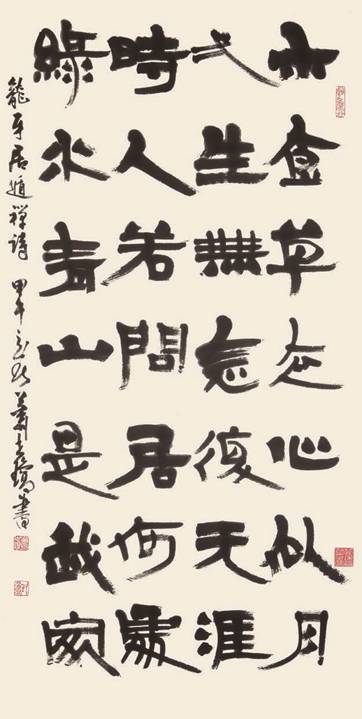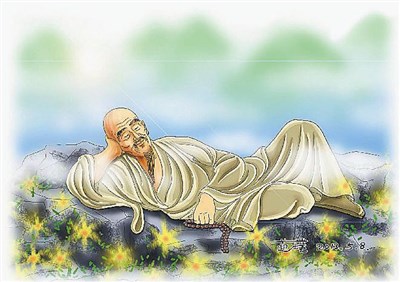ZEN MESTEREK ZEN MASTERS
« Zen főoldal
« vissza a Terebess Online nyitólapjára
龍牙居遁 Longya Judun (835-923)
(Rōmaji:) Ryūge Koton
(Magyar átírás:) Lung-ja Csü-tun
His posthumous name is Great Master Zhengkong 證空大師 [Shōkū Daishi].
Longya Judun 龍牙居遁 (835–923) was in the sixth generation of the Qingyuan 淸原
line and a direct heir of Dongshan Liangjie 洞山良价(807–869), one of the founders
of the Caodong 曹洞 (Jap. Sōtō) school. Judun was from Nancheng 南城 in Fuzhou
撫州 in present-day Jiangxi. After having his head shaved at the age of fourteen he visited
many teachers. Finally he came to Dongshan and remained with him for eight years. One
day he asked the master, “What is the meaning of the Patriarch’s coming from the West?”
Liangjie answered, “I will tell you when the Dong River runs uphill.” At these words
Judun was enlightened. He departed again on pilgrimage; among the masters he met
were Linji and Cuiwei Wuxue 翠微無學 (n.d.), with whom he had the exchanges recorded
in Critical Examinations 22 of the Linji-lu. These exchanges appear also in case 20 of the
Biyan-lu, where the roles of Linji and Cuiwei are reversed.
Poems

木食草衣心似月,
一生無念復無涯。
時人若問居何處?
綠水青山是我家。
Poem by 龍牙居遁 Longya Judun (835-923)
Calligraphy by 蕭世瓊 Xiao Shiqiong (1959-)

A rag-robed chewer of vegetables,
my heart is like the clear autumn moon
through and through.
Ask me where I'm from,
all I can say is
blue waters, blue mountains.
Translated by Yasuda Joshu and Anzan Hoshin
花開滿樹紅 |
朝看花開滿樹紅,暮看花落樹還空; ── 選自《禪門諸祖師偈頌》 |
TREE FILLED WITH RED FLOWER BLOSSOMS English translation: Zhi Yue |
In the morning, one sees a tree In the evening, one finds fallen flowers, If one compares these flowers to worldly affairs, |
── |
無心處處閒 |
粉壁朱門事甚繁,高牆大戶內如山; ── 選自《星雲說偈》 |
NO-MIND, CAREFREENESS EVERYWHERE English translation: Zhi Yue |
Within whitewashed walls and vermilion gates Inside the walls of the rich Don't say that there aren't hermits For as long as there is no-mind, |
── |
LONGYA JUDUN, “ZHENGKONG”
IN: Zen's Chinese heritage: the masters and their teachings
by Andy Ferguson
Boston: Wisdom Publications, 2000. pp. 239-240.
LONGYA JUDUN (835–923) was a disciple of Dongshan Liangjie. He came from ancient Fuzhou (now in modern Jiangxi Province). At the age of fourteen he left home to live at Mantian Temple in Jizhou. Later he received ordination on Mt. Song. Longya traveled far and wide, meeting and studying with many famous teachers such as Cuiwei Wuxue and Deshan Xuanjian. Eventually he came to study with Dongshan, under whom he realized great enlightenment. After a period of study with Dongshan, Longya continued traveling and engaged still more teachers, including Linji Yixuan, to deepen his understanding. Finally, he took up the abbacy of Miaoji Temple on Mt. Longya (near modern Changsha City), where a large congregation gathered from throughout the country. The following account of Longya's initial encounters with the great Zen adepts is taken from the Transmission of the Lamp .
When Longya met with Cuiwei he said, “Your student has been here for more than a month. Every day the master enters the hall to speak but we have not received any instruction about even one Dharma.”
Cuiwei said, “So what?” (A monk asked Dongshan this same question. Dongshan said, “Are you accusing me of something?” [Later,] Fayan said, “The ancestors are here!” Zen master Dongshan also said, “Were these three worthies intimate with it or not? If so, where? If not, where is the eye?”)
So Longya went to study under Deshan. He asked, “From afar I've heard of Deshan's ‘one phrase' Buddhadharma, but up to now I haven't heard the master say one phrase about the Buddhadharma. Why is this?”
Deshan said, “So what?”
Longya couldn't accept this, and so he went to study with Dongshan. Longya asked Dongshan the same question.
Dongshan said, “Are you accusing me of something?”
Longya then relayed the words spoken by Deshan. Suddenly awakening to their meaning on his own, he thereupon settled on Mt. Dong and sought instruction from Dongshan along with the other monks.
One day Longya asked, “What is the essential meaning of Zen?”
Dongshan said, “Wait until Dong Creek flows uphill. Then I'll tell you.”
Longya suddenly awoke to the deepest meaning of Dongshan's words.
After becoming abbot of Miaoji Temple, Longya's fame spread widely and he had many students. One day he entered the hall and addressed the monks, saying, “You who study must pass through the buddhas and ancestors before you'll understand. Zen master Xinfeng said, ‘The buddhas and ancestors are like deceptive thieves. If you gain some understanding, but are unable to penetrate beyond them, then they have deceived you.'”
A monk asked, “Do the buddhas and ancestors have deceptive minds or not?”
Longya said, “You're asking whether rivers and lakes have obstructive minds or not. Although rivers and lakes don't have obstructive minds, yet sometimes there are people who can't get across them, and they become like obstacles for people. So one can't say they don't obstruct people. Although the buddhas and ancestors don't have deceptive intent, sometimes people can't penetrate their meaning, and so they in effect become deceptive. Thus, one can't say they don't deceive people. When one penetrates the buddhas' and ancestors' deception, then one goes beyond the buddhas and ancestors and, for the first time, experiences their meaning. Then that person is the same as all the ancients. If one has not penetrated this understanding, but only studies the buddhas and ancestors, then in incalculable eons there will not be an instance of realization.”
The monk then asked, “How can one avoid being deceived by the buddhas and ancestors?”
Longya said, “You must awaken on your own.”
![]()
Lung-ja Csü-tun, 835-923
Fordította: Terebess Gábor
Folyik a híd, Officina Nova, Budapest, 1990, 97-98. oldal
Lung-ja kilépett a gyülekezetből, és Tö-san mester elé járult:
– Ha megfenyegetlek, hogy leütöm a fejed a világ legélesebb pallosával, mit teszel? – kérdezte.
Tö-san behúzta a nyakát.
– Már le is vágtam! – mondta Lung-ja.
Tö-san mosolygott.
Lung-ja később meglátogatta Tung-sant, és megemlítette neki az esetet.
– És mit mondott Tö-san? – kérdezte Tung-san.
– Nem mondott semmit.
– Nem mondott semmit? Akkor mutasd a fejét, amit állítólag leütöttél!
Lung-ja most döbbent rá, hogy mellétalált.
Longya Judun (Ryuge Koton, 835-923):
http://zen.gportal.hu/gindex.php?pg=4792614&nid=2439726
Forrás: All a Mistake: Poems of Soto Zen Masters
translated by Yasuda Joshu roshi and Anzan Hoshin roshi
Magyar fordítás: Hadházi Zsolt
1.
Rongy öltözékű zöldség rágó,
szívem mint tiszta őszi hold
keresztül-kasul.Kérdezd honnan jövök,
csak annyit tudok mondani:
kék vizek, kék hegyek.
2.
Egy szoba,
egy paplan,
egy kancsó,
egy tál.
Elég.Az út
lefele visz
a faluba, de
még azt sem tudom
hogy néznek ki a házak.